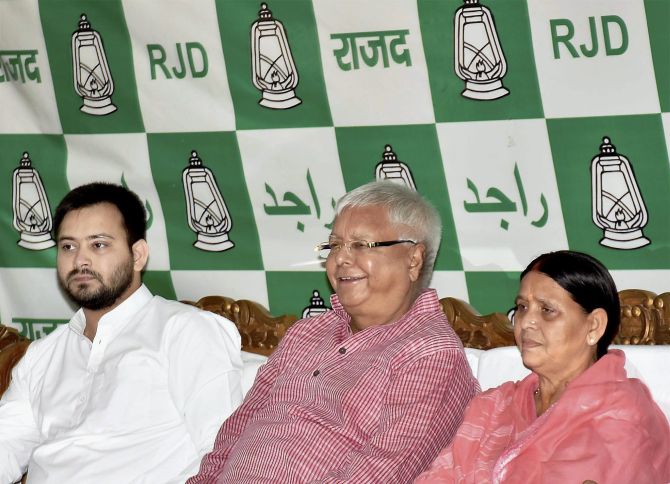 | « Back to article | Print this article |
'On corruption the Yadavs of UP and Bihar will find it very tough to give an answer to the accusations of the BJP and its supporters,' says Aakar Patel.

The crisis in Bihar reveals a larger problem that India's Opposition political parties face.
They will continue to face this problem and it will hurt them in 2019 and the general election.
The problem is credibility and I will come to that in a moment.
The issue is Bihar is simple: Deputy Chief Minister Tejashwi Yadav has been accused of corruption.
The Central Bureau of Investigation has filed a First Information Report on this.
The government has revealed or leaked details of some of the assets held by Yadav and his family.
The accusations are damning, particularly the revelation of the scale of the assets.
There is almost no defence of the deputy chief minister in the media.
The family head is Lalu Prasad Yadav, who is one of the most enthusiastic advocates of a common front against the BJP.
The Bihar government is run by an alliance of Yadav's party, the Rashtriya Janata Dal, along with Chief Minister Nitish Kumar's party, the Janata Dal-United.
The two parties were once linked by a common ideology, which can be described as Lohiate Socialism (named after one of the most fascinating individuals of Indian politics, Dr Ram Manohar Lohia, who is now almost entirely forgotten).
Originally, the Socialists were all opposed to the Congress.
However after the rise of the Bharatiya Janata Party, and particularly the success of its movement against the Babri Masjid, the Lohiaite politicians became anti-Hindutva and were open to alliances with the Congress.
Though some of the Socialists held on to their anti-Congressism, like George Fernandes and to some extent Nitish Kumar, almost all of them have returned to their original anti-BJP stand.
Now they are being accused of hypocrisy and of abandoning ideology.
What sort of Socialism is it when political leaders and their families make billions in states where the majority is poor?
Reports on the Yadavs refer to benami transactions worth a thousand crore rupees or more.
I accept that these are accusations that must be proven in a court of law, but the defence has not been factual.
The Yadavs have said things like they are not afraid of the BJP and will fight the communal forces etc.
The other thing the Congress was accused of by the Socialists is promoting a dynasty, a charge that was true.
Who can deny that Nehru promoted Indira and that Rajiv was followed as Congress chief by Sonia?
But again, we do not expect Socialists to form dynasties themselves.
The Yadavs of Uttar Pradesh have captured the 'Samajwadi' Party, which is Samajwadi only in name, totally.
Barely a third cousin or uncle' son has not been given a Lok Sabha or Vidhan Sabha ticket and when elected, hardly one is kept out of government.
This then is the record of the Socialists who say that they are fighting divisive and communal politics in India.
Now it is true that their commitment to the minorities is strong and their vision of India is inclusive. But they have no credibility on issues that are not concerned with religion in politics.
On corruption the Yadavs of UP and Bihar will find it very tough to give an answer to the accusations of the BJP and its supporters.
This lack of credibility has damaged them severely.
It is very unlikely that the major issue of the 2019 government will be communalism.
The reason for this is that the BJP has normalised violence on issues like cattle slaughter.
The country can comfortably absorb the murder of Muslims every few days in lynchings and it is not seen as that big an issue.
If it was, then we would see a reflection of that. We do not.
It is shameful, but it is true. These things are seen as minor issues.
The dominant narrative will be a repeat of the election of 2014.
Modi will say that India is being held back by corrupt leaders who are soft on terrorism and allow India to be damaged because they are only interested in themselves and enriching their families.
This is a simplistic argument and I do not think it is accurate. However, it is up to the political Opposition to put up a defence and a counterattack.
So long as their response is limited to accusations of communalism, it will not be enough.
They will need a central narrative that convinces the majority of Indians that they can be trusted to run governments without corruption.
That they are personally above suspicion in the way that Manmohan Singh was, and Narendra Modi is.
Looking at Bihar, UP and many of the other states, it is difficult to see how this is going to be possible with the same faces who have been tainted for so many years.
This is a burden that the Opposition carries into 2019.
Unless it is able to acknowledge this and act vigorously to change it, they will come undone just as they were in 2014, because of it.
Aakar Patel is Executive Director, Amnesty International India. The views expressed here are his own.
IMAGE: Former Bihar chief ministers Lalu Prasad Yadav, centre, and Rabri Devi, right, with their son Bihar Deputy Chief Minister Tejashwi Yadav. Photograph: PTI photo